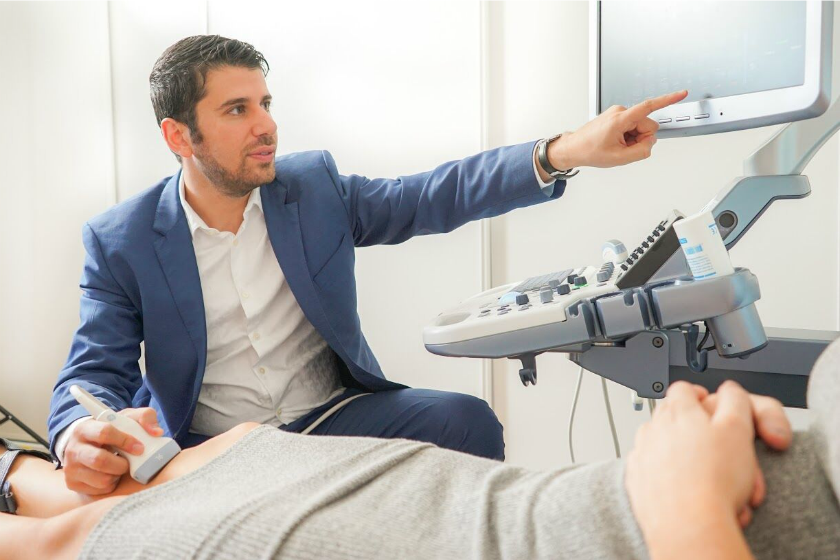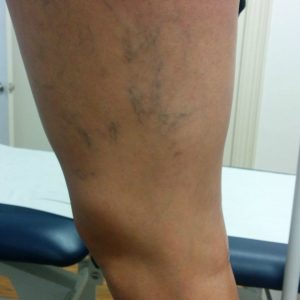The quick, minimally invasive way to treat varicose veins

Posted on
There are always those moments from when you’re young that stick in your mind for one reason or another.
Amongst far more pleasant ones, one thing I’ll never forget was someone telling me about a relative who was getting a varicose vein removed.
The procedure involved something about putting in a needle, sending it through the vein and then literally stripping the vein out of her body. I’m not great with anything medical at the best of times, but the imagery this conjured up still sticks with me to this day. I wasn’t entirely sure what a varicose vein was, but all I knew was I was terrified of getting one.
And it turns out that description was pretty accurate. The traditional treatment of varicose veins involves a doctor literally pulling out a vein during a procedure under general anaesthetic at the hospital. Not only could it take weeks to recover, but the chance the vein would grow back is around 35-45%.
But newer varicose vein treatments are nothing like that. Treatments are quick, minimally invasive, and performed in a private clinic using local anaesthetic. Even better—patients can walk straight out after the treatment with no downtime.

Dr Zil Yassine.
The Vein Institute is a private clinic specialising in the treatment of varicose veins, offering state-of-the-art laser technology.
With a passion for all-things veins, director Dr Zil Yassine first opened the clinic in Sydney in 2014. He now leads a team of specialist phlebologists, and interventional radiologists at clinics across Canberra, Sydney, Melbourne, and Brisbane.
While they offer traditional varicose veins surgical techniques, Dr Zil says the clinics are all about helping patients with minimally invasive options and the least downtime and disruption.
Varicose veins aren’t actually a singular issue, but are the result of a medical condition which can make some veins swollen, enlarged and twisted with a blue or purple appearance. While any vein in the body can become varicose, the veins most commonly impacted are those in the legs. So what causes them?
“We don’t really know. We believe it’s a genetic condition in 70% of cases, with maternal inheritance rates being higher than paternal,” said Dr Zil.
“There’s a Danish study that shows if you stand for more than eight hours a day, like with nurses or hospitality staff, there is an increased presence, but the oral contraceptive pill, multiple pregnancies or trauma to your legs can also play a role.”
Some people who get varicose veins may notice no real symptoms at all, while for others it may get in the way of everyday life and cause swelling, pain, itchiness or a feeling of heaviness in the legs. Some more severe cases can lead to ulcers, blood clots or deep vein thrombosis.
To treat varicose veins, The Vein Institute offers a range of procedures which are as effective as surgery but don’t require hospitalisation.
One of the most effective is the Endovenous Laser Ablation where a laser is inserted into the relevant vein. First, a local anaesthetic is inserted to minimise pain, then the laser seals the vein from the inside so it will shrink over time and disappear as the body heals.
The initial session takes about 45 minutes, and the patient can walk in and out. Patients generally then need two short 30 minute follow up sessions which just involve an injection at the site. The treatments offer a 98% success rate of the vein not re-growing.
Just because you have varicose veins, doesn’t mean you have to treat them, but Dr Zil said it’s best to get them looked at by a professional.

“The general advice I give is to have the veins assessed and addressed—at least then you get an expert opinion as to the severity. But it’s up to the patient whether they want treatment or not,” he said.
“If the veins are affecting your lifestyle every day, for example, if after work you have to spend half an hour raising your legs to get them feeling normal, I’d suggest you should consider a form of treatment and reap the benefits.”
the essentials
What: The Vein Institute is a vein clinic specialising in laser treatment of painful varicose veins.
Where: Barton Street Specialist Centre, Level 2, 3 Sydney Ave, Barton
Phone: 1300 535 017
Web: theveininstitute.com.au
The information provided in this article is provided for information purposes only. You should seek assistance from a health care professional when interpreting these materials and applying them to your individual circumstances.
If you have any concerns about your health, consult your general practitioner. Information provided in this article does not imply endorsement of third-party services or products and cannot provide you with health and medical advice.




Leave a Reply
You must be logged in to post a comment.